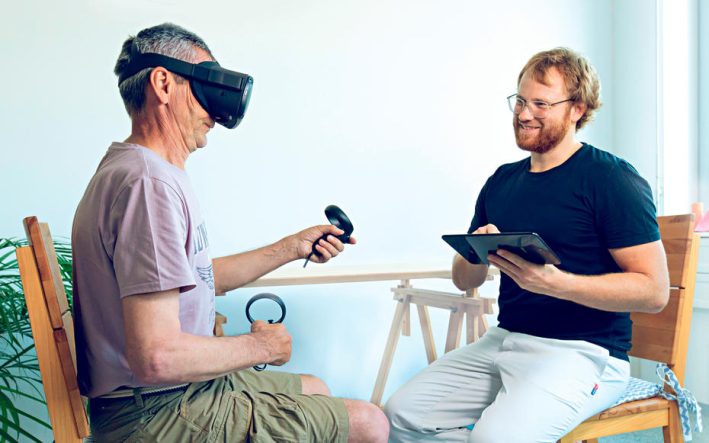Stroke is the most common neurological diagnosis. Every year, 15 million people suffer a stroke worldwide, and a third of them have impairments of motor function, speech or vision. 20% are younger than 60. Many stroke affected cannot use their arm in everyday life, and this hugely affects their quality of life. Imagine cooking a meal for the family with just one hand.
The complex functionality of our hands is a challenging aspect of the rehabilitation process. An interdisciplinary team of doctors, psychologists, occupational therapists and nurses utilize various therapeutical approaches, including mirror therapy, biofeedback, observation and imagination of movement and „forced use therapy“, to help recover hand functionality The process of hand rehabilitation for stroke patients usually takes several months to years. That is why it is particularly important for the patient to stay motivated through a lot of therapy, even if the immediate improvements seem small, so that function is not lost entirely.
The success of the rehabilitation process depends on a high amount of effective therapy time. In rehabilitation centers, therapists cannot devote as much time as needed on the individual because of high personnel costs. This is why new ways of independent training are necessary to offer more therapy time at nearly the same costs.
Independent training for hand rehabilitation most commonly consists of mirror therapy and observation of movement. These methods, however, are not very adaptable to the specific needs of the patient:
– the difficulty of the exercise is not adjustable
– there is no feedback if the exercise is done correctly
– small improvements go unnoticed
– and minimal hand function cannot be integrated into the exercise.
Combining virtual reality and gesture control can compensate these shortcomings, moving the evidence based approaches of mirror therapy and observation of movements from the real to the virtual world.
Only three things are needed:
- a smartphone with
- a compatible VR headset and
- a sensor for hand tracking.
These devices are enough to create a completely new training environment that is playful, motivating, task-oriented and repetitive. In this virtual reality, the user has the impression of using two functioning hands to carry out tasks.
Gründer:
- Georg Teufl
- Bernhardt Kern
Auszeichnungen:
- EDISON für „social entrepreneurship“ 2017
- Winner of the e-Health Challenge 2017
- 3rd place at the Forbes Start-up-Challenge
- One of Upper Austria´s hottest international start-ups 2018
- Winner of 120 seconds the best Business idea, Upper Austria 2018










